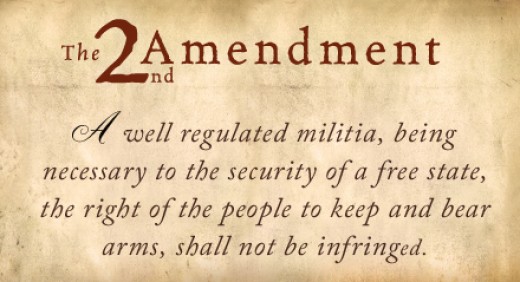In earlier blogs, I have discussed how the right to bear arms is connected to the State’s right to marshal a militia for the security of the state:
A well regulated Militia, being necessary to the security of a free State, the right of the people to keep and bear Arms, shall not be infringed.
This is the amendment that was approved after the U.S. Constitution was ratified. But what was the thinking in the States about the militia and this right before the Constitution was ratified? Were state governments worried about this right to bear arms?
This is a good question to ask because the States were believed by many to be closer to “the people” and therefore to be better at protecting their rights. For example, during the debates in the Constitutional Convention, Oliver Elseworth, the representative from Connecticut said, “The states are the best Judges of the circumstances & temper of their own people.”*
This view that states were closer to the people is why anti-Federalists argued that the states should preserve their sovereignty and that the Federal government should not have too strong a set of powers.
It is thus interesting to find that the state constitutions that were written between the Declaration of Independence and the ratification of the Constitution, and should have been “closer to the rights of the people,” are conspicuously silent or ambiguous on the individual right to bear arms. None of them seem concerned about it. What that means for the debate about the second amendment, is a matter we will come back to.
Militias, State Constitutions and the Right To Bear Arms
It is interesting to find that the state constitutions do not mention a right to bear arms. Indeed, many of the state constitutions don’t talk about individual rights at all and focus instead on the structure of the legislature, executive and judiciary only. Of those that mention arms, most do so in the context of talking about the need for a militia. None mention the individual right to bear arms.
Let’s look at some examples. Perhaps the most relevant is the Virginia state constitution from the home state of James Madison and Thomas Jefferson.
On Madison’s and Jefferson’s Home State of Virginia
Constitution of Virginia (June 29, 1776):
That a well-regulated militia, composed of the body of the people, trained to arms, is the proper, natural, and safe defence of a free State; that standing armies, in time of peace, should be avoided, as dangerous to liberty; and that in all cases the military should be under strict subordination to, and governed by, the civil power.
Virginia, Madison and Jefferson’s home state, approved its constitution shortly before the Declaration of Independence by the colonies. The Virginia Bill of Rights was written by George Mason and approved on June 12, 1776 and became the preamble of the Virginia Constitution which was approved on June 29, 1776. The Virginia Bill of Rights latter influenced many of the subsequent state constitutions and seems to have directly influenced Madison’s version of the Bill of Rights he submitted to Congress over a decade later.
The language and assumptions of the Virginia constitution anticipate both the U.S. Constitution and the Bill of Rights. And since Madison was from Virginia, and was a drafter or the Bill of Rights, we know that the Virginia language did influence him. But there are also some very interesting differences between these various versions.
Let’s start with the ideas that remain consistent from the Virginia constitution to the Federal Constitution and Bill of Rights:
First is the idea that a non-professional military (“a militia”) is critical for the security of the state. We also see here the then familiar assumption that a “standing army” (or full-time professional army) was considered dangerous to liberty. The idea was that regular people, who were engaged in everyday life (not professional military) should be trained for military service. Since they were not professional military, the assumption was that they would not be coopted by the political powers and turned against the liberty of the local populations. While the Virginia constitution does not say the state may press persons into military service, that would seem to be an implicit implication. For if the State must have a non-professional, non-permanent militia, how else shall it ensure one? We shall see that other states make this assumption explicit, namely, that a state can conscript people into militia duty.
To summarize, the Virginia state constitution is focused, not on individual rights per se, but on the right of the state to defend itself and have a well-regulated militia to do so. The logic of the Virginia Constitution seems to be this:
People come together into a state for security and protection. The State therefore needs to provide protection since that is one of its purposes. A professional army, however, is a danger to liberty, because it is comprised of people who may not be local residents and can be used by the political state to take away liberty. A military force therefore must come from the local people, themselves, in the form of a militia. The State therefore has the right to press people into military service. An individual’s liberty to avoid service is thus relinguished when living in the social contract of the state. Read this way, the Virginia Constitution focuses on protecting the right of the state to conscript and train a body of people for military service. In Madison’s home state, therefore, and in the Virginia Bill of Rights he was influenced by, we see no mention of an individual right to bear arms. On the contrary, we see what looks like a protection of the State’s obligation to have a militia and the right to press individuals into military service, a right that overrides their rights to do avoid that duty.
One could argue, I suppose, that there was no reason to mention the right to bear arms in the Virginia constitution since it was taken for granted that Virginians were gun owners at the time. But the Virginia Bill of Rights goes out of its way to protect and call out other individual rights in general, such the right to a free press, religious conscience, the right to jury and so forth. The fact that neither the Virginia Bill of Rights nor the Virginia Constitution make mention of an individual’s right to bear arms is arguably significant. This absence suggests that the Virginia legislatures did not conceive of gun possession as a right on the same level as free press and religious conscience.
The language of the Virginia constitution anticipates both the language and the assumptions of the current second amendment with some significant differences.
(Virginia State Constitution):
That a well-regulated militia, composed of the body of the people, trained to arms, is the proper, natural, and safe defence of a free State…
(Madison’s version of the amendment as proposed to Congress):
the right of the people to keep and bear arms shall not be infringed; a well armed and well regulated militia being the best security of a free country;
(Approved Second Amendment):
A well regulated Militia, being necessary to the security of a free State, the right of the people to keep and bear Arms, shall not be infringed.
Note how the approved second amendment and the wording of the Virginia constitution both start with the need for a well-regulated militia being critical for the security of the state. But the Virginia constitution says nothing about the right of the people to bear arms, whereas the approved second amendment does. That could be because the approved second amendment is recognizing a right of individuals. But it could be ambiguous, as I’ve discussed elsewhere, because “the right of the people” is a way of talking about states’ right to conscript people into the military.
Thomas Jefferson’s position on a right to bear arms
While the Virginia constitution and Virginia Bill of Rights made no explicit provision for an individual right to bear arms, it is interesting to see that Thomas Jefferson, another Virginian who was distinguishing himself at the same time, did think there was an individual right to bear arms. Jefferson, of course, would go on to be a very close colleague of James Madison and we know that Madison and Jefferson corresponded later about the Bill of Rights.
At the time the Virginia constitution was being drafted, Jefferson was in Philadelphia at the Second Continental Congress starting to draft his Declaration of Independence. Ironically, at the time, Jefferson actually wanted to be back in Virginia so he could participate in the drafting of the Virginia State Constitution. But he had to take his turn in Philadelphia at the Congress to cover his more senior colleagues who had returned to Virginia to draft the state constitution. As luck would have it, this is when Jefferson was assigned to write the Declaration of Independence.**
In any case, while in Philadelphia, Jefferson wrote out what he considered a draft constitution for Virginia. But his draft arrived late to his colleagues inVirginia and while it did influence the condemnation of Great Britain and King George in the Virginia constitution, his version of the state laws did not significantly impact the Virginian version. But Jefferson did have something to say about the right to bear arms in his drafts of the Virginia constitution. Let’s see how Jefferson thought about the matter in 1776. The brackets indicate language that Jefferson first wrote and then deleted as he reworded the language.
First Jefferson draft for the Virginia Constitution:
No freeman shall ever be debarred the use of arms. there shall be no standing army but in the time of actual war***
In this first draft of the law, Jefferson states unequivocally that free individuals have a right to use of arms. There are actually two versions showing how Jefferson had revised it. He had written that, “No soldier shall be capable of continuing in peace” and then changed it to “there shall be no standing army but in the time of actual war,” the wording we have above. Although Jefferson does not mention the militia explicitly, he appears to link the right to bear arms to the fact that there cannot be a standing army and thus may implicitly connect the idea of bearing arms to the need for a militia.
But what is really interesting is Jefferson’s revision in his next version of his proposal for Virginia’s Constitution. The brackets represent words he added to the earlier draft.
Jefferson’s Second and Third draft of the Virginia Constitution:
No freeman shall be debarred the use of arms [within his own lands or tenements]. There shall be no standing army but in the time of actual war.****
In his second and third drafts, possibly after receiving a draft of the Virginia constitution, Jefferson significantly restricts the right to bearing arms to a person’s private estate or lands. This is a dramatic limitation. It suggests that Jefferson, the ultimate champion of rights, envisions that the right to bear arms as linked to and an extension of the rights of defending one’s property. But Jefferson explicitly forbids the right to bear arms off one’s property.
Thus even Jefferson, who goes further than the Virginia Constitution to envision an individual right to use arms, and who is often cited as the ultimate defender of liberty, limits that right to a person’s own property.
Other State Constitutions
We have seen, then, that Virginia, the home state of Madison and Jefferson, does not acknowledge a right to bear arms and instead focuses on the state’s need for a militia and the implied need to press people into military service. A similar disregard for an individual right to bear arms is visible in many of the other state constitutions that followed. Let’s look at other state constitutions that were approved before the Constitution was ratified.
Constitution of Georgia (Feb. 5, 1777)
ART. XXXV. Every county in this State that has, or hereafter may have, two hundred and fifty men, and upwards, liable to bear arms, shall be formed into a battalion; and when they become too numerous for one battalion, they shall be formed into more, by bill of the legislature; and those counties that have a less number than two hundred and fifty shall be formed into independent companies.
The Georgia constitution uses the language of “bear arms” without declaring it a right. Instead, it discusses how the militia of the state shall be created and organized. If a county has at least 250 men “liable to bear arms,” meaning old enough to bear arms, then it shall constitute a battalion. The implication is that the State can force the counties to create battalions and that the counties can conscript people into military service.
Similarly the New York and Philadelphia state constitutions focus on the need for the militia and says nothing about the individual right to bear arms.
Pennsylvania (September 28, 1776) and New York (April 20, 1777)
And whereas it is of the utmost importance to the safety of every State that it should always be in a condition of defence; and it is the duty of every man who enjoys the protection of society to be prepared and willing to defend it; this convention therefore, in the name and by the authority of the good people of this State, doth ordain, determine, and declare that the militia of this State, at all times hereafter, as well in peace as in war, shall be armed and disciplined, and in readiness for service. That all such of the inhabitants of this State being of the people called Quakers as, from scruples of conscience, may be averse to the bearing of arms, be therefrom excused by the legislature; and do pay to the State such sums of money, in lieu of their personal service, as the same; may, in the judgment of the legislature, be worth. And that a proper magazine of warlike stores, proportionate to the number of inhabitants, be, forever hereafter, at the expense of this State, and by acts of the legislature, established, maintained, and continued in every county in this State.
Instead of emphasizing a right to bear arms, the states of Pennsylvania and New York are explicit that “it is the duty of every man who enjoys the protection of society to be prepared and willing to defend it.” These states are explicit that military service is an obligation of living under the protection of the state. Instead of a right to bear arms, the focus is on the duty to serve. The right to be protected by the state goes with a duty of military service. Because New York and Pennsylvania conceive of military service as a civil obligation, these state constitutions explicitly take up the case of Quakers, who are pacifists, and indicate that Quakers can be excused from personal military service by paying a tax instead.
We saw something similar in Madison’s draft of the amendment for the Bill of Rights, which gave exemption to people of conscience, suggesting that Madison may have had in mind the New York and Philadelphia Constitution when he drafted his version of the amendment.
Here again, for convenience, is Madison’s language when he proposed the amendment to Congress in 1787:
the right of the people to keep and bear arms shall not be infringed; a well armed and well regulated militia being the best security of a free country; but no person religiously scrupulous of bearing arms shall be compelled to render military services in person.
In Madison’s proposed wording of the second amendment, religious pacifists are exempt from military duty. This allusion back to the New York and Pennsylvanian constitutions gives further support to the idea that Madison was conceptualizing his amendment as mandating an obligation to serve in the militia. Because he conceptualized “the people” as having a right to create a militia, they therefore had the right to press members of the state into service. This is why Madison had to deal with the case of religious pacifists.
Not all State Constitutions mention the need for a militia or the right to bear arms. New Jersey (July 2, 1776) published its Constitution but mentioned no right to bear arms and no need for a militia. New Hampshire’s Constitution (January 5, 1776) mentions a militia but says nothing about the right to bear arms. Similarly, South Carolina’s Constitution (March 26, 1776) says nothing about a militia or the right to bear arms. The same is true of Delaware State Constitution (Sept. 10, 1776).
But in November 1776, Maryland (Nov. 11, 1776) offered a series of protections for individuals and does speak about the militia. In language that seems close to Virginia’s constitution, Maryland’s constitution states:
XXV. That a well-regulated militia is the proper and natural defence of a free government.
XXVI. That standing armies are dangerous to liberty, and ought not to be raised or kept up, without consent of the Legislature.
XXVII. That in all cases, and at all times, the military ought to be under strict subordination to and control of the civil power.
We see again that the concern is with protecting the people from “standing armies,” by guarding the need for a militia. No mention is made of an individual right to bear arms, though it does say that Maryland citizens are protected by the common law of Great Britain (III).
In December of that year, 1776, North Carolina does mention that the people have a right to bear arms. But, as we now see, it is interprets that right “for the defence of the State.”
Constitution of North Carolina (Dec 18, 1776)
XVII. That the people have a right to bear arms, for the defence of the State; and, as standing armies, in time of peace, are dangerous to liberty, they ought not to be kept up; and that the military should be kept under strict subordination to, and governed by, the civil power.
North Carolina is the first State constitution to make explicit use of the language that the people have a right to bear arms. But it is explicit that that right is “for the defence of the State,” not for individuals. Like the constitutions of Virginia, New York, Pennsylvania and Maryland, the focus is on protecting the people from a permanent army by giving them the right to have a militia, or to “bear arms”. Bearing arms, therefore, appears, in the State constitutions at least, to be a kind of synonym for the militia and for the right to impress individuals into military service.
We see a similar inclination in the Vermont Constitution (July 8, 1777)
IX. That every member of society hath a right to be protected in the enjoyment of life, liberty and property, and therefore, is bound to contribute his proportion towards the expense of that protection, and yield his personal service, when necessary, or an equivalent thereto; but no part of a man’s property can be justly taken from him, or applied to public uses, without his own consent, or that of his legal representatives; nor can any man who is conscientiously scrupulous of bearing arms, be justly compelled thereto, if he will pay such equivalent; nor are the people bound by any law’ but such as they have, in like manner, assented to, for their common good.
XV. That the people have a right to bear arms, for the defence of themselves and the State: and as standing armies, in the time of peace, are dangerous to liberty, they ought not to be kept up; and that the military should be kept under strict subordination to, and governed by the civil power.
http://avalon.law.yale.edu/18th_century/vt01.asp
Vermont makes explicit what was implicit elsewhere. The benefits of society come with a responsibility to yield personal service. The clear implication is that this means military service. This is why the constitution mentions the right of any man who is a pacifist to be exempt. In language very close to that of North Carolina, Vermont’s constitution goes on to say that the people have a right to bear arms “for the defence of themselves and the State.” The words “for defence of themselves and the State” suggest that the right is not only for protecting the State with a militia but for “defending themselves” in some additional way. This could be the first explicit State allusion to a right to bear arms to defend one’s property or even guard themselves against the power of the State. In any case, this is as close to a right to bear arms as we find in the state constitutions, considered so far.
We see, then, that, apart from Vermont, none of the states actually articulate an individual right to bear arms. Some of them focus on the need for a state militia and some make clear there is a state right to conscript individuals into the militia. None of the other state constitutions suggest that there is any right of individuals to bear arms apart from the need for militia defense.
Summary
The state constitutions, as I indicated, were thought to be closer to the right of the people than the Federal constitution. Yet the states, for the most part, express no concern around protecting an individual right to bear arms. They are concerned about protecting the people from the risks of a standing professional army which they view as a core threat to liberty. The militia was the alternative to the standing army, because the militia was drawn from the people themselves. It was not permanent. Individuals were not military professionals. The people had local ties to the population and returned to the populace after their service. To ensure,therefore, that the state could execute its role to defend itself, it had a right and mandate to create a militia. Military service was thus an obligation of male citizens living in a state and benefiting from the security of the state. The discussion of arms in the state constitutions, therefore, focus on the state’s right to have, raise money for, and train a militia. As several States recognize, this means the state has a right to press people into militia service.
This foregoing interpretation of the state constitutions, incidentally, is consistent with some of the constitutions of the colonies in the century before the States achieved independence from Great Britain. The Fundamental Constitutions of Carolina from In March 1, 1669 includes the following
One hundred and sixteen. All inhabitants and freemen of ()arolina above seventeen years of age, and under sixty, shall be bound to bear arms and serve as soldiers, whenever the grand council shall find it necessary.
____________________
*Notes on the Federal Constitution, Tuesday August 7th, 401.
**More on this topic in my book, Liberty in America’s Founding Moment.
***Boyd, The Papers of Thomas Jefferson, I:344).
****Boyd, The Papers of Thomas Jefferson, I. 353) and Online.




